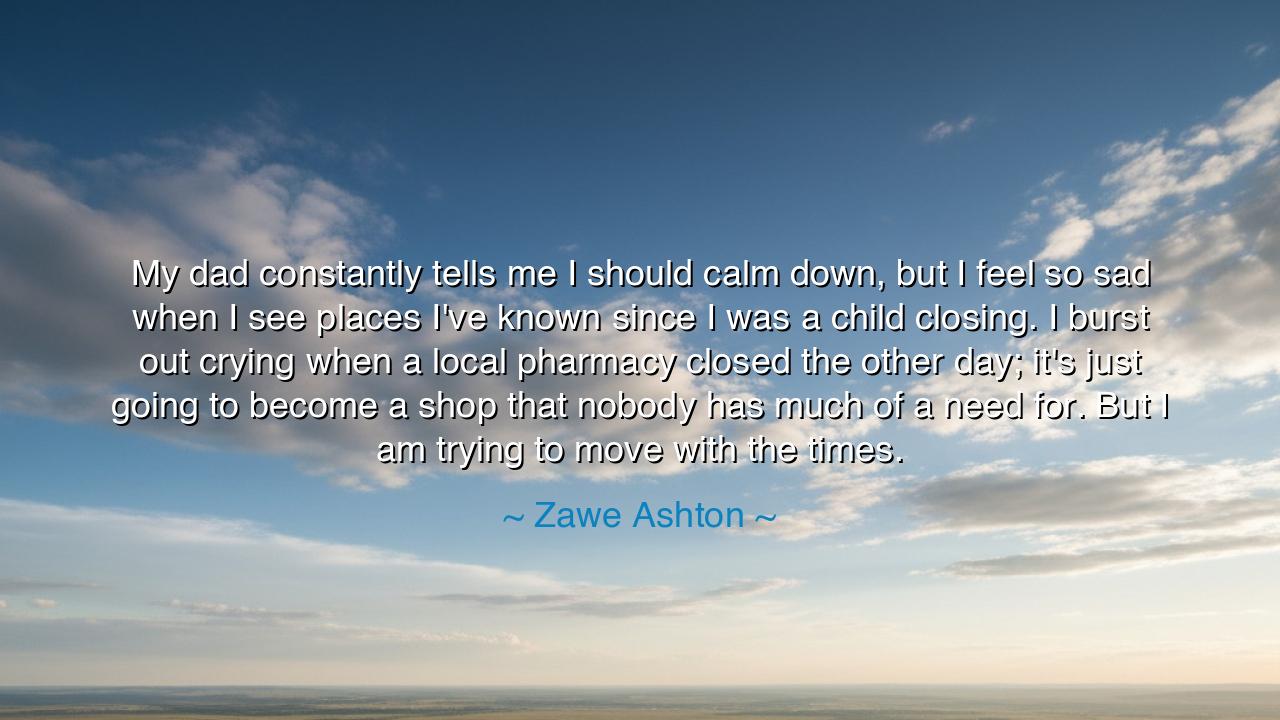
My dad constantly tells me I should calm down, but I feel so sad
My dad constantly tells me I should calm down, but I feel so sad when I see places I've known since I was a child closing. I burst out crying when a local pharmacy closed the other day; it's just going to become a shop that nobody has much of a need for. But I am trying to move with the times.






Hearken, O seekers of wisdom, to the words of Zawe Ashton, who laments: “My dad constantly tells me I should calm down, but I feel so sad when I see places I've known since I was a child closing. I burst out crying when a local pharmacy closed the other day; it's just going to become a shop that nobody has much of a need for. But I am trying to move with the times.” In these words lies a meditation upon memory, change, and the poignant ache of witnessing the passage of time. Ashton reminds us that the places of our youth are not mere locations, but repositories of emotion, identity, and the tapestry of experience that shapes our very being.
From the earliest civilizations, philosophers and poets observed that the passing of familiar landscapes and traditions evokes both sorrow and reflection. In the writings of Herodotus, travelers mourned the loss of cities, temples, and marketplaces that had been central to their lives, yet these memories became treasures of wisdom, reminding the observer of the impermanence of all earthly things. Ashton’s reflection mirrors this eternal truth: change is inevitable, and the heart’s attachment to the familiar deepens both grief and gratitude for what has been.
The words also illuminate the tension between attachment and adaptation. Ashton feels profound sadness at the loss of places she has known since childhood, yet she also recognizes the need to move with the times. This duality is ancient and enduring: the wise soul honors memory and heritage, while also embracing the flow of life. In the Bhagavad Gita, Arjuna is counseled to act without attachment to outcome, to navigate the world with mindfulness, balancing respect for what was with acceptance of what must come.
Consider the example of Vincent van Gogh, who frequently painted landscapes and towns of his youth. When these places changed or disappeared, he expressed both grief and appreciation through his art, preserving memory while engaging with the present. Ashton’s tears at the closure of a local pharmacy echo this human impulse: to mourn the loss of familiar spaces, yet to carry their essence forward in thought, feeling, and memory. Memory becomes a bridge between past and present, a sacred repository of what once shaped the soul.
Her reflection also underscores the importance of emotional honesty. To feel sadness deeply is not weakness, but a testimony to the richness of one’s attachments and experiences. The ancients recognized that grief, whether for places, people, or times past, sharpens the soul’s awareness and cultivates empathy, reflection, and reverence for impermanence. Ashton’s willingness to cry, to mourn, and to articulate her sorrow is itself a mark of wisdom, honoring both memory and the reality of change.
From this meditation emerges a timeless lesson: embrace the emotions stirred by loss, yet cultivate the resilience to move forward. Change is the constant law of life; places fade, customs evolve, and people grow apart. By balancing remembrance with adaptation, one preserves the essence of the past while engaging meaningfully with the present. Ashton exemplifies this balance: acknowledging grief while striving to move with the times.
Practical counsel flows naturally: honor the places, people, and experiences that shaped you, but do not become imprisoned by nostalgia. Create rituals of memory, reflect upon the lessons of the past, and engage with the evolving world with awareness and openness. In doing so, one nurtures both emotional depth and adaptive resilience, allowing the past to inform the present without constraining it.
Thus, O listener, let the words of Zawe Ashton illuminate your understanding: the passage of time brings sorrow, yet also growth. The closing of familiar places may awaken tears, but it also invites reflection, gratitude, and adaptation. By embracing the fullness of memory and moving with the currents of life, one cultivates a heart that honors both what was and what yet may be, finding strength and meaning in the delicate dance between grief and renewal.






AAdministratorAdministrator
Welcome, honored guests. Please leave a comment, we will respond soon